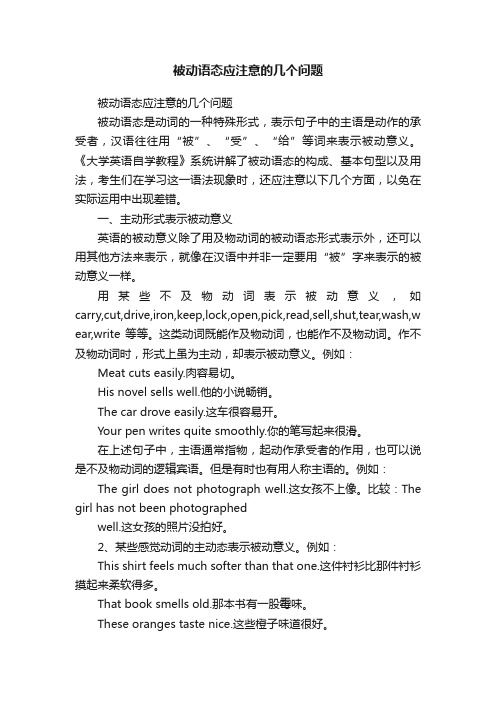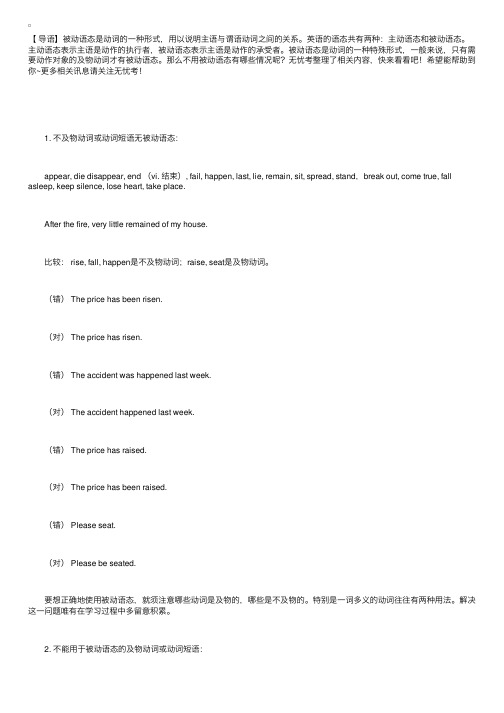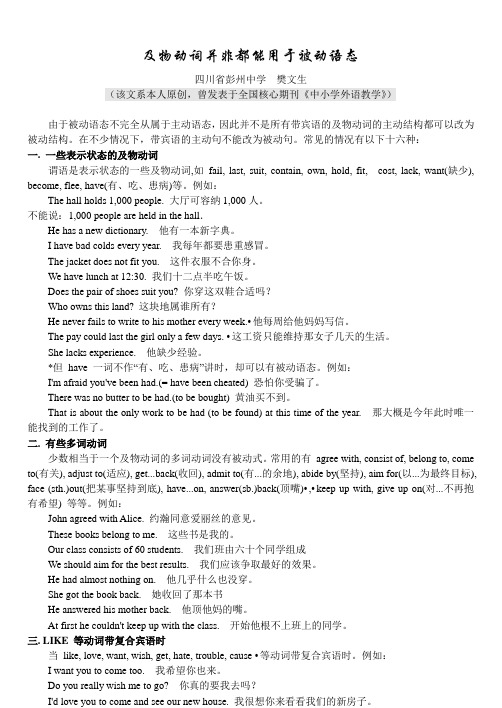不能用于被动语态的动词
英语不能用被动语态的情况

不能用被动语态的情况初中语法:1) 不及物动词或动词短语无被动语态:appear, die disappear, end (vi. 结束), fail, happen, last, lie, remain, sit, spread, stand break out, come true, fall asleep, keep silence, lose heart, take place.After the fire, very little remained of my house.比较:rise, fall, happen是不及物动词;raise, seat是及物动词。
(错) The price has been risen.(对) The price has risen.(错) The accident was happened last week.(对) The accident happened last week.(错) The price has raised.(对) The price has been raised.(错) Please seat.(对) Please be seated.要想正确地使用被动语态,就须注意哪些动词是及物的,哪些是不及物的。
特别是一词多义的动词往往有两种用法。
解决这一问题唯有在学习过程中多留意积累。
2) 不能用于被动语态的及物动词或动词短语:fit, have, hold, marry, own, wish, cost, notice, watch agree with, arrive at / in, shake hands with, succeed in, suffer from, happen to, take part in, walk into, belong to This key just fits the lock.Your story agrees with what had already been heard.3) 系动词无被动语态:appear, be become, fall, feel, get, grow, keep, look, remain, seem, smell, sound, stay, taste, turnIt sounds good.4) 带同源宾语的及物动词,反身代词,相互代词,不能用于被动语态:die, death, dream, live, lifeShe dreamed a bad dream last night.5) 当宾语是不定式时,很少用于被动语态。
被动语态

不用被动语态的几种情况1.不及物动词不能用于被动语态。
➢The sun is rising.➢When did the thing occur?2.系动词(look、sound、feel、smell、taste、appear、seem、go、prove、turn、become、fall、get、keep)不能用于被动语态。
➢It sounds very good.3.表示开始、结束、运动的动词(begin、start、finish、open、close、stop、end、shut、run、move)不用于被动语态。
➢Class begins at eight o’clock.4.read、write、wash、smell、wear、lock等动词与well、easily、smoothly等连用时,主动形式表被动意义.➢The pen writes smoothly.➢The coat washes easily.5.一部分动词(print fry hang build make)用进行时,就可以表示被动意义。
➢The novel is painting.➢The supper is cooking6.这些动词(need want require deserve),以物做主语时,后面接的动名词的主动形式表被动意义。
➢My watch needs/wants/requires repairing.➢Who said the boy deserves punishing?7.一部分及物动词(fit、wish、cost、leave、enter、reach、suit、benefit、lack、own)不用于被动语态。
8.一些动词短语(break out、take place、lose heart、come true、belong to、consist of、add up to、suffer from、happen to、take part in)不能用于被动语态。
初中英语语法大全:不用被动语态

初中英语语法大全:不用被动语态各位读友大家好,此文档由网络收集而来,欢迎您下载,谢谢初中英语语法大全:不用被动语态不用被动语态的情况1) 不及物动词或动词短语无被动语态:appear, die disappear, end , fail, happen, last, lie, remain, sit, spread, stand break out, come true, fall asleep, keep silence, lose heart, take place.After the fire, very little remained of my house.比较:rise, fall, happen是不及物动词;raise, seat是及物动词。
The price has been risen.The price has risen.The accident was happened last week.The accident happened last week.The price has raised.The price has been raised.Please seat.Please be seated.要想正确地使用被动语态,就须注意哪些动词是及物的,哪些是不及物的。
特别是一词多义的动词往往有两种用法。
解决这一问题唯有在学习过程中多留意积累。
2) 不能用于被动语态的及物动词或动词短语:fit, have, hold, marry, own, wish, cost, notice, watch agree with, arrive at / in, shake hands with, succeed in, suffer from, happen to, take part in, walk into, belong toThis key just fits the lock.Your story agrees with what had already been heard.3) 系动词无被动语态:appear, be become, fall, feel, get,grow, keep, look, remain, seem, smell, sound, stay, taste, turnIt sounds good.4) 带同源宾语的及物动词,反身代词,相互代词,不能用于被动语态:die, death, dream, live, lifeShe dreamed a bad dream last night.5) 当宾语是不定式时,很少用于被动语态。
英语中不能用于被动语态的动词都有哪些

1.need, want, require(要求,需要), deserve(应得,值得), be worth值得),not bear(经不住) +doing主动表被动。
Eg. The book is worth reading. 这本书值得一读。
The old building requires repairing. 这座古建筑需要修了。
These young seedlings will require/need looking after (=need to be looked after)这些幼苗将需要小心的照管。
你的头发该剪了。
2. 不定式作定语,放在被修饰词后面,与前面被修饰的名词或代词有动宾关系,又在句子中与另一名词或代词有主谓关系,不定式要用主动表被动含义。
I have much work to do. 我有许多要做的事情。
(与work有动宾关系,与I有主谓关系)Tom is looking for a room to live in. Tom在找一间住的房间。
(与room有动宾关系,与Tom 有主谓关系)他要维持一个家庭。
(与family有动宾关系,与he有主谓关系)3. 不定式修饰作表语和宾语补足语的形容词时,结构:主语+系动词+形容词+ 不定式;动词+宾语+形容词+不定式。
如果形容词是表示难易、利弊等含义,如difficult, easy, comfortable(舒适的), convenient(便利的,方便的), hard, cheap, expensive, 等,不定式用主动表被动。
The question is difficult to answer. 这个问题很难回答。
The work is easy to do. 这项工作很好做。
I found the car comfortable to ride in. 我觉得这种车很好坐。
That makes poetry difficult to write. 那就使得诗很难写。
被动语态应注意的几个问题

被动语态应注意的几个问题被动语态应注意的几个问题被动语态是动词的一种特殊形式,表示句子中的主语是动作的承受者,汉语往往用“被”、“受”、“给”等词来表示被动意义。
《大学英语自学教程》系统讲解了被动语态的构成、基本句型以及用法,考生们在学习这一语法现象时,还应注意以下几个方面,以免在实际运用中出现差错。
一、主动形式表示被动意义英语的被动意义除了用及物动词的被动语态形式表示外,还可以用其他方法来表示,就像在汉语中并非一定要用“被”字来表示的被动意义一样。
用某些不及物动词表示被动意义,如carry,cut,drive,iron,keep,lock,open,pick,read,sell,shut,tear,wash,w ear,write 等等。
这类动词既能作及物动词,也能作不及物动词。
作不及物动词时,形式上虽为主动,却表示被动意义。
例如:Meat cuts easily.肉容易切。
His novel sells well.他的小说畅销。
The car drove easily.这车很容易开。
Your pen writes quite smoothly.你的笔写起来很滑。
在上述句子中,主语通常指物,起动作承受者的作用,也可以说是不及物动词的逻辑宾语。
但是有时也有用人称主语的。
例如:The girl does not photograph well.这女孩不上像。
比较:The girl has not been photographedwell.这女孩的照片没拍好。
2、某些感觉动词的主动态表示被动意义。
例如:This shirt feels much softer than that one.这件衬衫比那件衬衫摸起来柔软得多。
That book smells old.那本书有一股霉味。
These oranges taste nice.这些橙子味道很好。
以上这些动词都不能用进行时表示。
若用进行时,则表示主动含义。
英语语法:不用被动语态的情况

【导语】被动语态是动词的⼀种形式,⽤以说明主语与谓语动词之间的关系。
英语的语态共有两种:主动语态和被动语态。
主动语态表⽰主语是动作的执⾏者,被动语态表⽰主语是动作的承受者。
被动语态是动词的⼀种特殊形式,⼀般来说,只有需要动作对象的及物动词才有被动语态。
那么不⽤被动语态有哪些情况呢?⽆忧考整理了相关内容,快来看看吧!希望能帮助到你~更多相关讯息请关注⽆忧考! 1. 不及物动词或动词短语⽆被动语态: appear, die disappear, end (vi. 结束), fail, happen, last, lie, remain, sit, spread, stand,break out, come true, fall asleep, keep silence, lose heart, take place. After the fire, very little remained of my house. ⽐较: rise, fall, happen是不及物动词;raise, seat是及物动词。
(错) The price has been risen. (对) The price has risen. (错) The accident was happened last week. (对) The accident happened last week. (错) The price has raised. (对) The price has been raised. (错) Please seat. (对) Please be seated. 要想正确地使⽤被动语态,就须注意哪些动词是及物的,哪些是不及物的。
特别是⼀词多义的动词往往有两种⽤法。
解决这⼀问题唯有在学习过程中多留意积累。
2. 不能⽤于被动语态的及物动词或动词短语: fit, have, hold, marry, own, wish, cost, notice, watch agree with, arrive at / in, shake hands with, succeed in, suffer from, happen to, take part in, walk into, belong to This key just fits the lock. Your story agrees with what had already been heard. 3. 系动词⽆被动语态: appear, be become, fall, feel, get, grow, keep, look, remain, seem, smell, sound, stay, taste, turn It sounds good. 4.带同源宾语的及物动词,反⾝代词,相互代词,不能⽤于被动语态: die, death, dream, live, life She dreamed a bad dream last night. 5. 当宾语是不定式时,很少⽤于被动语态。
不能用于进行时态和被动语态的动词

1. belong to属于……Our success belongs to all the people present. 我们的成功属于在座的每一个人。
2. stand, lie等静态动词这些动词表某物位于某处。
There stands a high building over there. 那边矗立着一座高高的楼房。
3. taste, feel, look, smell, sound 等感官动词This kind of food tastes good. 这种食物尝起来味道很好。
Ice always feels cold to us. 对我们来说冰摸起来总是冷的。
4. stay, keep, remain等动词The weather has stayed hot recently.最近天气一直很热。
After his election to a high office, he remained modest. 在被选为高级领导干部之后他仍然谦虚。
5. sell well( 畅销), last well(持久), wash well(耐洗), write well(写起来流畅)等动副搭配This kind of flower sells well. 这种花很畅销。
The pens produced in this factory write well .这家工厂生产的钢笔写起来流畅。
6. wash easily(易洗), break easily(易折), write smoothly(写起来流畅), light easily(易燃)等动副搭配This kind of cloth washes easily. 这种布容易洗。
It is very wet, the match does not light easily.天气很潮湿,火柴不易划着。
7. meet 遇见;碰到I met him in the street at eight yesterday morning. 昨天早晨8点钟我在街上碰到他。
被动语态语法知识点精讲

被动语态语法知识点精讲:一、不用被动语态的情况(1) 不及物动词或动词短语无被动语态:appear, die disappear, end (vi. 结束), fail, happen, last, lie, remain, sit, spread, standbreak out, come true, fall asleep, keep silence, lose heart, take place.After the fire, very little remained of my house.比较:rise, fall, happen是不及物动词;raise, seat是及物动词。
(错) The price has been risen. (对) The price has risen.(错) The accident was happened last week.(对) The accident happened last week. (2) 不能用于被动语态的及物动词或动词短语:fit, have, hold, marry, own, wish, cost, notice, watch agree with, arrive at / in, shake hands with, succeed in, suffer from, happen to, take part in, walk into, belong toThis key just fits the lock.Your story agrees with what had already been heard.(3) 系动词无被动语态:appear, be become, fall, feel, get, grow, keep, look, remain, seem, smell, sound, stay, taste, turn It sounds good.(4) 带同源宾语的及物动词,反身代词,相互代词,不能用于被动语态:die, death, dream, live, lifeShe dreamed a bad dream last night.(5) 当宾语是不定式时,很少用于被动语态。
英语语法不能用被动语态的几种情况

英语语法不能用被动语态的几种情况1)某些表示“静态”的及物动词(表示状态而不是动作,而且常常是不可用于进行时态的动词)如have,fit,suit,hold(容纳),cost,suffer,last(持续)等不能用于被动语态。
如:They have a nice car. 他们有一辆漂亮的汽车。
My shoes don't fit me. 我的鞋不合适。
My brain can't hold so much information at one time. 我的脑子一下子记不住这么多资料。
How much /What does it cost?这值多少钱?Our holiday lasts 10days. 我们的假期有十天。
This food will last(them)(for)3days. 这食物足够(他们)(吃)三天。
2)不是所有带介词的动词都能用于被动结构。
若是构成成语动词通常有被动态,若不构成成语动词则无被动态。
试比较:They arrived at a decision. /A decision was arrived at. 他们作出了决定。
They arrived at the station. 他们到达车站。
(不说:The station was arrived at. )He looked into the question. /The question was looked into. 他调查了这个问题。
3)动词leave(离开),enter(进入),join(参加)这一类词不可用于被动语态。
如:The car left the road and hit a tree. 车子离开了道路,撞上了树。
4)某些及物动词可作不及物动词用,特别是后加副词(如well,easily 等)时。
主动语态有被动含义,这类动词常见的有sell,write,wear,wash,cook,open,close,lock,read,record等。
英语中不能用于被动语态的动词都有哪些

英语中不能用于被动语态的动词都有哪些-CAL-FENGHAI.-(YICAI)-Company One11.need, want, require(要求,需要), deserve(应得,值得), be worth值得),not bear(经不住) +doing主动表被动。
Eg. The book is worth reading. 这本书值得一读。
The old building requires repairing. 这座古建筑需要修了。
These young seedlings will require/need looking after (=need to be looked after) carefully.这些幼苗将需要小心的照管。
Your hair wants/needs cutting (needs to be cut).你的头发该剪了。
2. 不定式作定语,放在被修饰词后面,与前面被修饰的名词或代词有动宾关系,又在句子中与另一名词或代词有主谓关系,不定式要用主动表被动含义。
I have much work to do. 我有许多要做的事情。
(与work有动宾关系,与I有主谓关系)Tom is looking for a room to live in. Tom在找一间住的房间。
(与room有动宾关系,与Tom 有主谓关系)He has a family to support.他要维持一个家庭。
(与family有动宾关系,与he有主谓关系)3. 不定式修饰作表语和宾语补足语的形容词时,结构:主语+系动词+形容词 + 不定式;动词+宾语+形容词+不定式。
如果形容词是表示难易、利弊等含义,如difficult, easy, comfortable(舒适的), convenient(便利的,方便的), hard, cheap, expensive, 等,不定式用主动表被动。
The question is difficult to answer. 这个问题很难回答。
及物动词并非都能用于被动语态

及物动词并非都能用于被动语态四川省彭州中学樊文生(该文系本人原创,曾发表于全国核心期刊《中小学外语教学》)由于被动语态不完全从属于主动语态,因此并不是所有带宾语的及物动词的主动结构都可以改为被动结构。
在不少情况下,带宾语的主动句不能改为被动句。
常见的情况有以下十六种:一. 一些表示状态的及物动词谓语是表示状态的一些及物动词,如fail, last, suit, contain, own, hold, fit,cost, lack, want(缺少), become, flee, have(有、吃、患病)等。
例如:The hall holds 1,000 people. 大厅可容纳1,000人。
不能说:1,000 people are held in the hall.He has a new dictionary.他有一本新字典。
I have bad colds every year.我每年都要患重感冒。
The jacket does not fit you.这件衣服不合你身。
We have lunch at 12:30. 我们十二点半吃午饭。
Does the pair of shoes suit you? 你穿这双鞋合适吗?Who owns this land? 这块地属谁所有?He never fails to write to his mother every week.•他每周给他妈妈写信。
The pay could last the girl only a few days. •这工资只能维持那女子几天的生活。
She lacks experience.他缺少经验。
*但have 一词不作“有、吃、患病”讲时,却可以有被动语态。
例如:I'm afraid you've been had.(= have been cheated) 恐怕你受骗了。
There was no butter to be had.(to be bought) 黄油买不到。
不能用于被动语态的整理总结

不能用于被动语态的总结1、there be结构及所有的不及物动词或动词短语充当谓语时,无被动语态。
There are twelve mon ths in a year.The war broke out in 1937. (break out,爆发)The story took place in a small mountain village. (take place 发生)常见的不及物动词或动词短语有:appear, die, happe n, lie躺;位于),rema in, occur, come true, break out, take place 等。
2、表示“状态”的谓语动词,女如: last, hold, keep, suit, remain, look like, consist of 等不能用被动语态。
The hall can hold more tha n 500 people. (hold 容纳)The project lasted 14 years and cost 1 billio n US dollars. (las延续)No dish suits all tastes. (suit适合)The committee con sists of ten members 委员会由十人组成。
3、表示“归属”的动词,如have,own,belong to等。
We have three meals a day我们一日吃三餐。
We have six classes every day. (hav上课)Our success bel ongs to all the people.我们的成功属于每一个人。
(bel ong to,属于)4、表示“希望、意图”的动词,如wish,want,hope,like,love,hate等。
But I hate autu mn and win ter。
- 1、下载文档前请自行甄别文档内容的完整性,平台不提供额外的编辑、内容补充、找答案等附加服务。
- 2、"仅部分预览"的文档,不可在线预览部分如存在完整性等问题,可反馈申请退款(可完整预览的文档不适用该条件!)。
- 3、如文档侵犯您的权益,请联系客服反馈,我们会尽快为您处理(人工客服工作时间:9:00-18:30)。
英语中不能用于被动语态的动词都有哪些?最佳答案你就记住一些动词应用中只能用主动表示被动。
1、Need, want, require, be worth后面接doing主动表被动。
The book is worth reading. 这本书值得一读。
The old building requires repairing. 这座古建筑需要修了。
Your hair wants/needs cutting (needs to be cut).你的头发该剪了。
2、不定式作定语,放在被修饰词后面,与前面被修饰的名词或代词有动宾关系,又在句子中与另一名词或代词有主谓关系,不定式要用主动表被动含义。
I have much work to do. 我有许多要做的事情。
(与work有动宾关系,与I有主谓关系)Tom is looking for a room to live in. Tom在找一间住的房间。
(与room有动宾关系,与Tom 有主谓关系)3、不定式修饰作表语和宾语补足语的形容词时,结构:主语+系动词+形容词+ 不定式;动词+宾语+形容词+不定式。
如果形容词是表示难易、利弊等含义,如:difficult, easy, comfortable, convenient(便利的,方便的), hard, cheap, expensive等,不定式用主动表被动。
The question is difficult to answer. 这个问题很难回答。
The work is easy to do. 这项工作很好做。
I found the car comfortable to ride in. 我觉得这种车很好坐。
4、在be to结构中的一些不定式:这种结构中的不定式通常应用主动表被动。
下列动词用不定式的主动形式表示被动意义:Who is to blame for starting the fire?这场火灾应由谁负责?You are to blame for the accident. 你应为这事受动责备。
The house is to let.此房出租。
A lot remains to do.还剩下许多事情要做。
5、系动词没有被动形式,但有些系动词常表示被动意义。
常见的有taste, sound , prove, feel, look,smell等,例如:Your reason sounds reasonable.你的理由听起来很合理。
Good medicine tastes bitter to the mouth.良药苦口。
6、一些与can't或won't连用的动词。
常用的有: lock, shut , open, act, write,cut,wear等,用作不及物动词时,用主动表被动。
例如The door won't open.这门打不开。
It can't move.它不能动。
7、一些动词如sell , wash, clean, burn, cook等与副词如well, easily, perfectly 等连用,描绘事物的特性,用主动表被动,结构是主语+动词+加副词。
例如: The book sells well.这种书很畅销。
These clothes wash easily.这些衣服很易洗。
The pen writes well. 这笔很好写。
8、主语much, a great deal, little, what等,其表语如是不定式,则用不定式的主动表被动。
What is to do? 做什么?Much is to do. 太多要做的事。
9、在“there be”句型中作主语的定语如果现在分词时,所用的现在分词要用主动表被动意义。
There is nothing doing these days. 这些天没事干。
I see there’s a good idea planning. 我知道又在打好主意。
英语中有这么一部分词,主动表示被动的含义,出了sell,比如feel,this silk shirt feels so fine! 这里并没有用被动语态,但是这件丝绸衬衫显然并不是感觉这个动作的发出者,其实是被人感知到fine。
类似单词还有:look, sound,taste... 可见,感官动词居多在英语中,当我们强调动作的性质,而不是发出者时,常常用主动表被动。
这类词的特征是后面经常只跟一个副词。
这些常用动词有:clean, cook, cut, draw, feel, iron, look, sell, read, wash, wear, write 等.Exercises: choose the best choice.1. There are many good films played by ChengLong that are worth _____.A. to be seenB. being seenC. seeingD. to see2. The food _____ easily and sells _____.A. cooks ; wellB. is cooking; goodC. is cooked; wellD. cooked; good3. The window s of the building can’t _____.,A. be closedB. closeC. be closingD. closedKey: 1-3 CAB使用被动语态应受哪些限制 2004/01/02 11:13 英语辅导报英语和汉语一样,其动作都有主动和被动之分,汉语中不是所有的动词都可采用被动结构;同样道理,英语中也有不少动词不能用于被动结构,即被动语态。
英语中,除不及物动词---即后面不能加宾语的动词不能用于被动语态外,还有下列情况不能使用被动语态的结构:一、表示静态、容纳、适合等的及物动词。
例如:She has a nice car.The woolen coat fits her well.二、宾语是动词不定式、动名词。
例如:They promised me to go with me.Mr.Smith wanted to have a try.I enjoy listening to pop music.三、宾语是反身代词。
例如:She hurt herself this morning.They warned themselves to be careful.四、宾语是人身上的一部分或器官。
例如:He put his hand on his chest and began to cough.I could hardly believe my ears.五、宾语是相互代词。
例如:They help each other in study.We must learn from each other.六、表示地点、处所、机构、团体、组织的名词作宾语。
例如:She joined the Party last year.My dad reached Beijing this afternoon.七、宾语表示行为、方式,在意义上相当于状语。
例如:She did her best.We shall make up our minds.八、宾语表示数量、重量、长度、大小等,在意义上相当于状语。
例如:They walked two miles.The film lasted one and a half hours.This desk weighs 10kilograms.九、系动词sound,look,become,appear等也不能用于被动语态。
例如:Miss Li became a doctor ten years ago.This plan sounds a good one.十、一些词,如happen,take place,occur,last,belong to等等,在汉语角度看来可用被动结构,但英语只能用主动结构。
例如:Great changes have taken place in my hometown since 1949.This car belongs to my uncle.十一、及物动词及其宾语在意义上构成不可分割的固定词组。
例如:I made faces to have the baby laugh.We should never lose heart.十二、一些宾语从句也不能变成被动语态,否则意义就变了。
例如:I knew that I was wrong then.(我认识到当时我错了。
)It was known that I was wrong then.=I was known to be wrong then.(人们知道当时我错了。
)十三、当宾语是抽象名词时。
例如:We showed special interest in science.十四、当宾语为同源宾语时。
例如:We lived a hard life in the old days.总之,能否用被动语态,除了应了解英语的一些语法规则之外,还要充分考虑汉语的说话习惯,掌握其普通规律,同时注意一些特殊情况,否则就会出现"中国式英语",也没法学到"地道的英语"。
越过"动词填空"这道关when ( )the accident?----(happen)要填在前面的空格里应该写悬赏分:5 | 解决时间:2009-2-28 21:16 | 提问者:丁丁love莞happen在这里是谓语前置,省略助动词吗?急!!!!!!!!!!!!!!问题补充:要把happen的正确形式填在空格里最佳答案happen在这里是谓语前置这里强调事件,应用happened二、同学们在使用happen时,以下三点情况值得注意:1. happen为不及物动词,不能用于被动语态。
例如,要表示"这个故事发生在去年。
"不能说:The story was happened last year.但可以说:The story happened last year.2. happen为短暂性动词,不能与表示一段时间的状语连用。
例如,要表示"这事发生一年了。
"不能说:This happened for one year.但可以说:This happened one year ago.3. happen一般用来强调某事发生的偶然性。
如要表示事先安排或有准备的事情或活动,则不能用happen,而要用take place。
